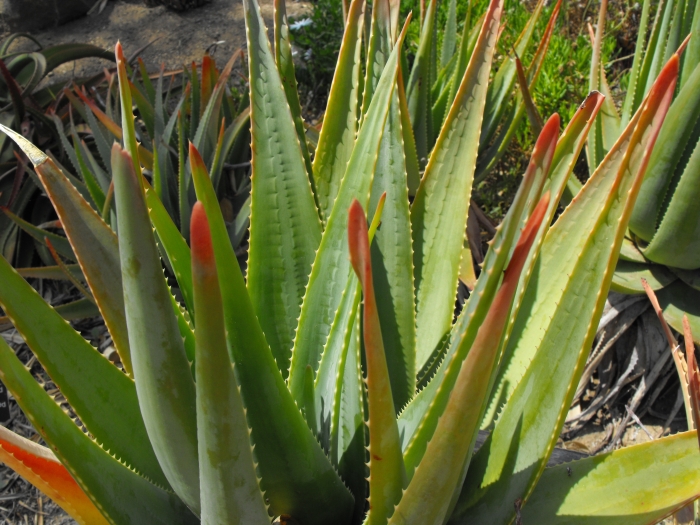Fynbos Aloe
(Aloe succotrina)
Fynbos Aloe (Aloe succotrina)
/
/

Stickpen
Public domain
Image By:
Stickpen
Recorded By:
Copyright:
Public domain
Copyright Notice:
Photo by: Stickpen | License Type: Public domain | License URL: https://creativecommons.org/public-domain/ | Uploader: Stickpen | Publisher: Wikimedia Commons | Title: Aloesuccotrina2.JPG | Notes: |

















Estimated Native Range
Summary
Aloe succotrina, commonly known as Fynbos Aloe, is an evergreen succulent native to the fynbos vegetation of the Western Cape in South Africa, where it thrives in rocky, sandy soils and is adapted to a Mediterranean climate with wet winters and dry summers. This plant typically forms dense clusters up to 1–2 meters (3.3–6.6 ft) in diameter, with leaves arranged in rosettes. The leaves are fleshy, blue-green, and edged with small white teeth. During the winter months from June to September, it produces a tall raceme with tubular, shiny red flowers that are highly attractive to sunbirds, which are the primary pollinators.
The Fynbos Aloe is valued for its drought tolerance and striking winter blooms, making it a popular choice for Mediterranean climate gardens, rockeries, and container planting. It adds a sculptural element to the landscape and is particularly showy when in flower. While it requires minimal maintenance, it is important to provide ample space for its mature size, as it can form large, dense clusters. Propagation is straightforward, either by cuttings or offshoots, or by seed. It thrives in full sun and requires very little water once established, making it an excellent plant for water-wise gardening. However, it is susceptible to root rot if overwatered or if the soil does not drain well. It is also prone to mealybugs and scale insects, which can be managed with careful monitoring and appropriate treatments.CC BY-SA 4.0
The Fynbos Aloe is valued for its drought tolerance and striking winter blooms, making it a popular choice for Mediterranean climate gardens, rockeries, and container planting. It adds a sculptural element to the landscape and is particularly showy when in flower. While it requires minimal maintenance, it is important to provide ample space for its mature size, as it can form large, dense clusters. Propagation is straightforward, either by cuttings or offshoots, or by seed. It thrives in full sun and requires very little water once established, making it an excellent plant for water-wise gardening. However, it is susceptible to root rot if overwatered or if the soil does not drain well. It is also prone to mealybugs and scale insects, which can be managed with careful monitoring and appropriate treatments.CC BY-SA 4.0
Plant Description
- Plant Type: Succulent
- Height: 3-4 feet
- Width: 1.5-3 feet
- Growth Rate: Moderate
- Flower Color: Orange, Red
- Flowering Season: Winter
- Leaf Retention: Evergreen
Growth Requirements
- Sun: Full Sun
- Water: Very Low, Low
- Drainage: Fast
Common Uses
Bee Garden, Bird Garden, Drought Tolerant, Fire Resistant, Hummingbird Garden, Low Maintenance, Potted Plant, Salt Tolerant, Showy Flowers
Natural Habitat
Fynbos vegetation of the Western Cape in South Africa
Other Names
Common Names: Table Mountain Aloe, Bombay Aloe, Sabila, Socotrine Aloe, Barbados Aloe
Scientific Names: , Aloe succotrina, Aloe soccotrina, Aloe purpurascens, Aloe soccotorina, Aloe perfoliata var. purpurascens, Aloe perfoliata var. succotrina, Aloe sinuata, Aloe soccotrina oppr, Aloe succotrina var. purpurascens
GBIF Accepted Name: Aloe succotrina Weston